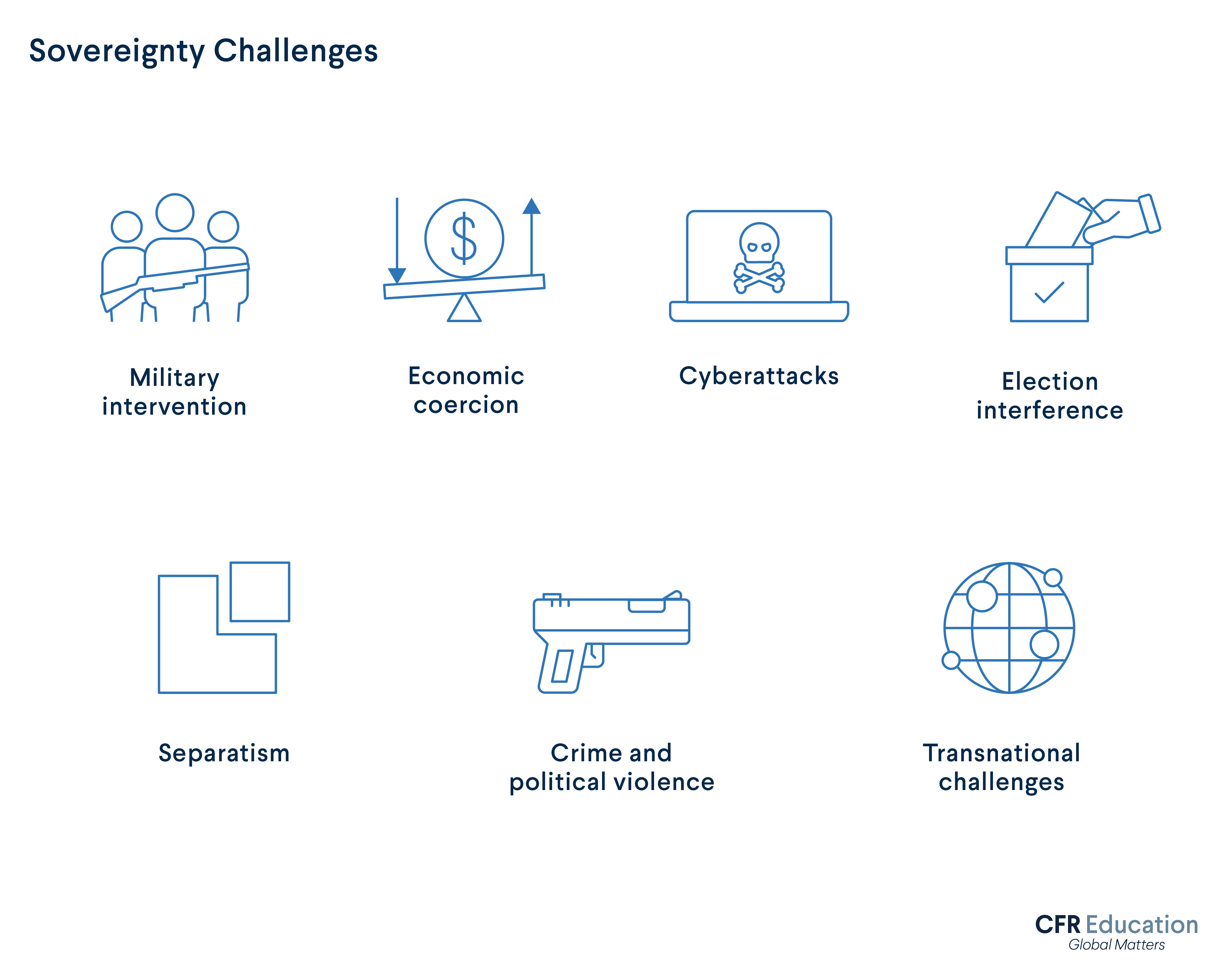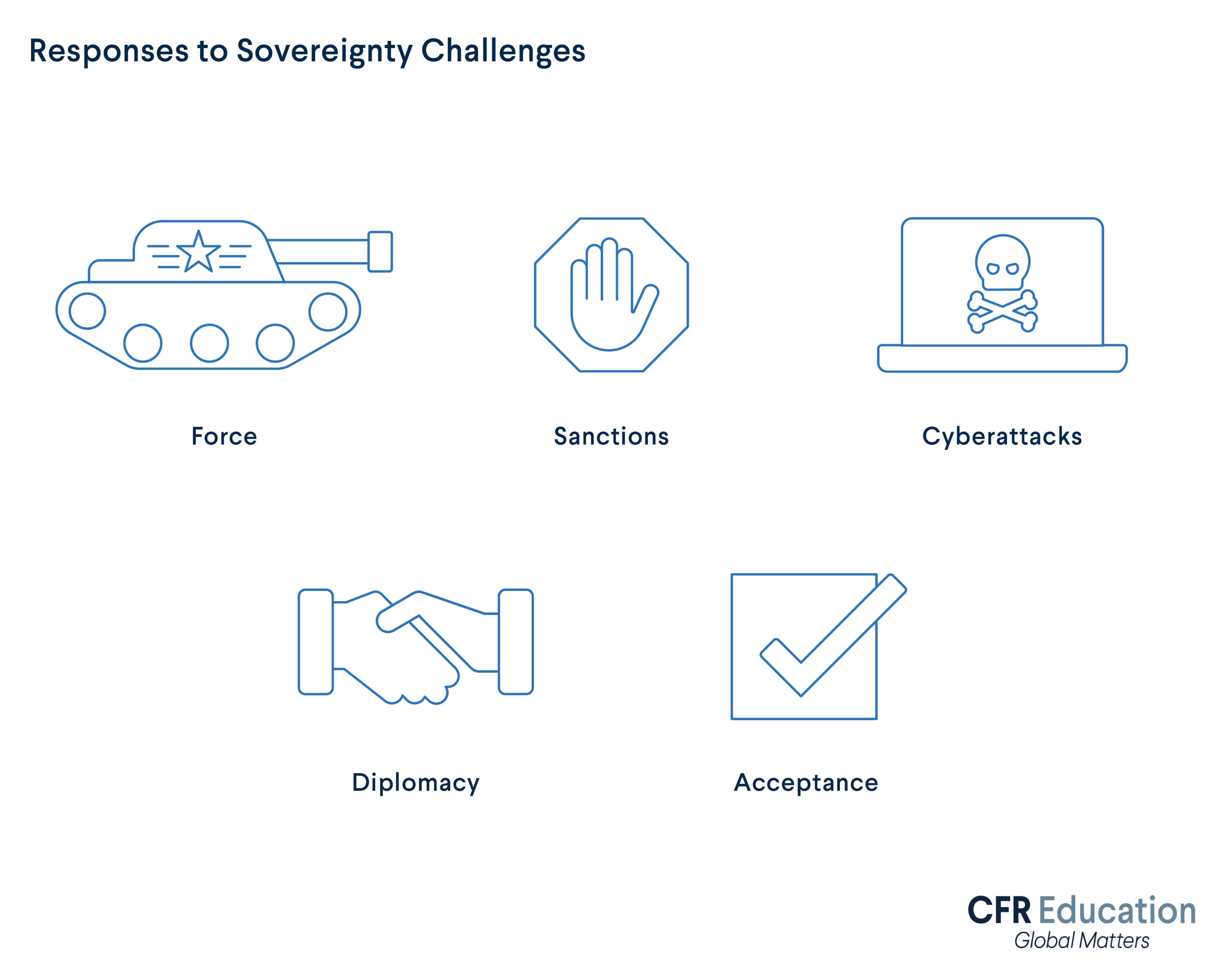Tanks, Sanctions, and Separatists: The Various Challenges to Sovereignty
A government’s authority within its borders gets challenged all the time. Here is how.
Sovereignty is one of the most important building blocks of the international political system. This concept means that countries get to control what happens inside their borders. Similarly, sovereignty prohibits countries from meddling in the internal affairs of others.
Certain forms of military intervention have long been atop the list of banned activities. Countries are barred, for example, from rolling tanks across borders to seize territory or overthrow a government. But countries today often argue that other behaviors can threaten their sovereignty, including economic sanctions or cyberattacks on their elections. Some countries even say foreign criticism of their internal policies interferes with their sovereignty. Countries also have different redlines when it comes to sovereignty. Some countries may respond to perceived breaches with forceful retaliation. While others might react with measured diplomacy—or let threats go unchallenged.
How Do Countries Challenge One Another’s Sovereignty?
Each of the 193 members of the United Nations is promised “sovereign equality.” This essentially means that countries agree not to invade or interfere with one another, especially militarily. Under this arrangement, borders are seen as sacrosanct; they act like “no trespassing” signs between countries. In theory, sovereign equality prevents countries in the international neighborhood from storming one another’s backyards. But, in reality, sovereignty is complicated. Governments see the principle challenged all the time.
Military intervention: For centuries, sovereignty has meant countries respect one another’s borders and don’t use force to change them. Armed intervention crosses this line and is likely the most recognizable challenge to sovereignty. However, international law sometimes permits the use of force in certain cases, such as in self-defense. This principle backed the UN approval of a U.S.-led coalition to expel Iraqi forces from Kuwait after Saddam Hussein’s 1990 invasion of that country in violation of its sovereignty.
Economic coercion: Sanctions are economic penalties countries use to compel people, companies, and other governments to change their behavior on a broad range of issues, including nuclear proliferation and human rights. They are designed to reduce—or, at their most draconian, shut down—financial and trade relations with the intended target, as when the United States cut most of its economic ties with Cuba in 1959.
But sanctions are not the only economic actions that incite debates over sovereignty. Organizations like the International Monetary Fund have been criticized for loans that impose conditions on the borrowing countries’ internal economic policies. China, in particular, has been accused of trying to gain political influence in other countries by offering large, bilateral loans.
Cyberattacks: In 2009, hundreds of uranium centrifuges in Iran stopped working as a result of a targeted cyberattack allegedly launched by Israel and the United States. The Stuxnet worm slowed what was seen as the dangerous and destabilizing growth of Iran’s nuclear capabilities. The cyberattack revealed how technology can now reach across borders, do physical harm, and interfere with sovereignty. Cyberattacks have the potential to inflict terrifying impacts—to derail trains, pollute water supplies, shut down the electricity grid, and down communications networks. The rules and norms of cyberattacks are still taking shape around these issues. However, sovereignty and noninterference have a place in cyberspace governance.
Election interference: Countries have the right to pick their own political system. Yet, the history of international relations tells a different story. From the 1914 assassination of Austria-Hungary’s future leader by a Serbian terrorist to the recent hacking and disinformation campaigns aimed at manipulating elections, the noninterference norm when it comes to choosing political systems and leaders has not always held. Russian interference in the 2016 U.S. presidential election is one example.
Separatism: Sovereignty connotes authority within borders. It means that, for example, the government of Spain is in charge of what happens in Spain. However, separatist movements challenge that authority when they strive for their own sovereignty. For instance, a bid for independence from a separatist faction within Spain might be viewed as a challenge to the Spanish government’s sovereignty. This played out in reality after the semi autonomous region of Catalonia voted to secede from Spain in 2017. The Spanish supreme court declared the referendum unconstitutional and the government arrested the leaders of the independence movement. Spain’s former prime minister stated he could not “negotiate sovereignty.”
Crime and political violence: Human trafficking and the international drug trade are two instances of crime increasingly crossing borders. The United Nations has called these offenses not just hazards to peace and development but threats to sovereignty. Higher rates of international crime expose political systems to bribery, fixed elections, and outside intervention. These crimes also undermine sovereignty by challenging a government’s sole right to lawfully use force within its borders. The principle of sovereignty also means that countries have the right to regulate what crosses its borders. For instance, terrorists of the self-proclaimed Islamic State blew through Iraqi and Syrian sovereignty by wreaking destruction and setting up a so-called caliphate across swathes of both countries.
Transnational challenges: In today’s interconnected world, what happens in one country does not stay there. For example, the actions of individual countries like China or the United States—worldwide leaders in carbon emissions—can speed up or slow down climate change, which threatens the planet. And when the coronavirus pandemic struck in late 2019, what China did (or did not do) to contain its spread within its borders had global repercussions. In a world full of transnational threats, some critics now question whether the traditional understanding of sovereignty—and its inviolability—still holds.
Countering Breaches of Sovereignty
When countries believe their sovereignty has been challenged, they can use various tools to address the situation. Countries can choose to use military force, cyberattacks, sanctions, diplomacy, and acceptance to defend their sovereignty.
So, when do countries send in the army? The UN Charter’s Article 51 recognizes a country’s right to self-defense. When attacked, military action is often the only tool a country can use to stop the aggressor. However, military defense is not a realistic option when the invaded country is weak or without allies. If a country faces a cyberattack, an option is to respond in kind; however, it can be difficult to immediately know how severe the attack is, where it came from, and whether the culprit is another country or a non-state actor. Another potential response to a breach of sovereignty is to impose sanctions on offending countries. These measures, which include asset freezes, travel bans, and arms embargoes, serve as a lower-cost and lower-risk alternative to responding militarily to a violation of sovereignty. However, these measures have their downsides: they may not compel offending countries to change their behaviors. Economic sanctions can also degrade living standards for ordinary citizens in the process.
Countries can also try to solve their sovereignty issues through diplomacy. This process includes direct communication between countries or bringing disputes to international institutions like the United Nations. Trying to change a country’s behavior by shining a light on its actions is sometimes known as naming and shaming. However, countries sometimes respond to sovereignty violations by doing nothing.
Some countries simply do not have the military or economic power to respond directly to challenges to their sovereignty. For instance, Somalia is currently too fragile to combat challenges to its sovereignty. These threats include the emergence of a breakaway nation (Somaliland) in its northwest. Compare this with more powerful countries, which can deploy large militaries, enact far-reaching sanctions, or ramp up international pressure to combat threats to their sovereignty.
What Happens When Countries Cross the Line?
When countries see their sovereignty breached, what ensues can vary widely. Sometimes, they respond with military action or economic penalties; other times, there is almost no retribution.
But what motivates governments to respond when another country’s sovereignty has been challenged? How can we expect countries to defend one another, potentially on the other side of the world? For some, it’s a matter of precedent: sovereignty and respect for borders underpin today’s world order. The failure to uphold this international value and to stand by as an infringement occurs abroad could risk inviting more in the future. Other times, countries may respond if potential violations of sovereignty are carried out by a rival.
But responding to breaches of sovereignty (and even agreeing on what counts as a breach) is rarely clear-cut. Check out how countries and international organizations have handled several situations involving sovereignty.
Iraq’s Invasion of Kuwait
What happened: In August 1990, Iraq was in steep debt and was eager to add Kuwait’s substantial oil reserves to its ledger. As a result, Iraqi leader Saddam Hussein invaded Kuwait after accusing it of overproducing and stealing oil. Iraq went on to annex Kuwait, as the country’s emir fled.
The response: On August 8, 1990, then U.S. President George H.W. Bush said in a televised address: “The acquisition of territory by force is unacceptable.” The UN Security Council imposed sanctions against Iraq. A withdrawal deadline of January 15 was later imposed by the UN for Saddam Hussein to remove troops from Kuwait. However, Iraq ignored the United Nations. A U.S.-led coalition commenced a UN-approved air and ground campaign against Iraqi forces. At the end of February 1991, Bush announced that Kuwait had been “liberated.” In this case, a clear violation of sovereignty was met with a UN-backed international military response.
Killing of Osama Bin Laden
What happened: The United States’ global war on terror began in the aftermath of the devastating attacks of September 11, 2001. Soon thereafter, Congress passed a wide-ranging resolution that authorized military force against anyone involved in the attacks. For years, Osama Bin Laden—the leader of al-Qaeda, the terrorist group that executed the attack—remained hidden. But in May 2011, a team of U.S. Navy SEALs raided a compound in Abbottabad, Pakistan, and killed Bin Laden. Unlike U.S. military action in Kuwait in 1991, the U.S. did not consult the United Nations before authorizing the assassination.
The response: Pakistan’s foreign ministry labeled the raid “an unauthorized unilateral action” and warned countries against taking similar steps. Its army issued a statement saying future actions infringing on Pakistan’s sovereignty would cause the country to reconsider its cooperation with the United States. While Pakistani Foreign Secretary Salman Bashir questioned the legality of the move, U.S. Attorney General Eric Holder argued the killing was in “national self-defense” and lawful. Instead of countering with military force or sanctions, the Pakistani government kept its response in the realm of politics and diplomacy.
2016 U.S. Presidential Election
What happened: In the run-up to the 2016 U.S. presidential election, John Podesta, campaign chair for the Democratic nominee Hillary Clinton, clicked on an email asking him to reset his password. What Podesta didn’t know was that the email was part of a coordinated, Russia-backed cyber campaign meant to interfere with the 2016 election. Hackers used Podesta’s credentials to gain access to the Democratic National Committee networks, leak emails, and spread disinformation across the internet in support of the Republican nominee Donald J. Trump.
The response: While still in office in 2016, then President Barack Obama threw nearly three dozen Russian intelligence agents out of the United States. The Obama administration also announced sanctions against several people and entities, including two Russian intelligence groups. Sanctions for election interference continued under the Trump administration. The United States added new restrictions in September 2018 over attempted meddling in that year’s midterm elections. Though international laws on cyberspace behavior are sparse, interference in another country’s elections can be considered a threat to sovereignty.
North Korea WannaCry Cyberattack
What happened: In 2017, a malicious piece of software called WannaCry infected hundreds of thousands of computers worldwide. This cyberattack locked governments, hospitals, and big companies such as FedEx and Renault out of information on their machines. Following the attack, the hackers held the information for ransom. The cyberattack, which was attributed to North Korea, hit Britain particularly hard. WannaCry cost the country’s health-care provider, the National Health Service (NHS), tens of millions of dollars.
The response: In 2018, the U.S. Department of Justice announced criminal charges against an alleged member of the North Korean–backed hacking group accused of creating the ransomware. Park Jin-hyok and the Lazarus Group were also targeted with sanctions. Meanwhile, Britain declared that it could carry out a retaliatory cyberattack but said that doing so would risk tit-for-tat escalation. Experts have argued that the attack violated sovereignty as it caused damage and interfered with a system under the British government’s authority.
Russian Conflict in Ukraine
What happened: On February 24th, 2022, Russian President Vladimir Putin authorized a “special military operation,” ordering his troops to invade neighboring Ukraine. In his statement, Putin claimed that the goal of the operation was to demilitarize and denazify Ukraine and end the alleged genocide of Russians in Ukrainian territory. This Russian invasion came after a series of prior territorial aggressions against the country. Most notably, the Kremlin illegally annexed Crimea, a region in southern Ukraine, in 2014.
The response: The majority of the international community, including the United States and the United Nations, has condemned Russia’s invasion of Ukraine. U.S. President Joe Biden declared the attack “unprovoked and unjustified.” Following the attack, the Biden administration issued severe sanctions against top Kremlin officials, including Putin and Russian Foreign Minister Sergey Lavrov; four of Russia’s largest banks; and the Russian oil and gas industry in coordination with European allies. Additionally, 141 of 193 UN member states voted to condemn Russia’s invasion in an emergency UN General Assembly session, demanding that Russia immediately withdraw from Ukraine. The conflict is still ongoing.



